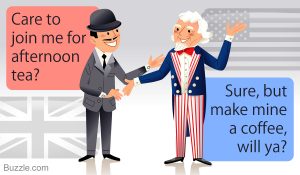What Are The Differences Between British & American English?
 There is an old saying that America and Britain are “two nations divided by a common language.” No one exactly knows who said this, but it does seem to reflect how we Brits feel about American English.
There is an old saying that America and Britain are “two nations divided by a common language.” No one exactly knows who said this, but it does seem to reflect how we Brits feel about American English.
But are American and British English really so divergent, and if so what are the key differences ?
1. Accent
The most obvious difference are accents. Whilst Britain has a vast range of different regional accents none are quite like any in the US. Likewise within the US there are some very different accents for instance consider the Texan and a New Yorker modes of speech.
The one big factor in the divergence of the British & American accents is “rhotacism”. The General American accent is rhotic and speakers pronounce the r in words such as hard. The BBC-type British accent is non-rhotic, and speakers don’t pronounce the r, leaving ‘hard’ sounding more like hahd.
It’s interesting to note that before and during the American Revolution, the English, both in England and in the colonies, mostly spoke with a rhotic accent.
See our article “How and When did the American Accent evolve?“
2. Vocabulary
Another noticeable difference between American and British English is vocabulary. There are hundreds of everyday words that are different. For example, Brits call the front of a car the bonnet, while Americans call it the hood.
Americans go on vacation, while Brits go on holidays, or hols.
New Yorkers live in apartments; Londoners live in flats.
Fortunately, most Americans and Brits can usually guess the meaning through the context of a sentence.
| apartment | flat |
| college | university |
| theater | theatre |
| vacation | holiday |
| chips | crisps |
| (french) fries | chips |
| the movies | the cinema |
| soda / pop / coke / soft drink | soft drink / fizzy drink |
| sneakers / tennis shoes | trainers |
| sweater | jumper |
| mailbox | postbox |
| band-aid | plaster |
| drugstore | chemist’s |
| soccer | football |
| cookie | biscuit |
See our article “When did the US start dropping the U from words such as colour?“
3. Grammar
Prepositions
The differences below are only a general rule. It’s fair to say that American speech has influenced Britain via pop culture, and vice versa. Therefore, some prepositional differences are not as pronounced as they once were.
| I’m going to a party on the weekend. | I’m going to a party at the weekend. |
| What are you doing on Christmas? | What are you doing at Christmas? |
| Monday through Friday. | Monday to Friday. |
| It’s different from/than the others. | It’s different from/to the others. |
Past Simple vs Present Perfect
Americans tend to use the past simple when describing something that has recently occurred, while people in the UK are more likely to use the present perfect.
| I ate too much. | I’ve eaten too much. |
| I went to the store. | I’ve been to the shop. |
| Monday through Friday. | Monday to Friday. |
| Did you get the newspaper? | Have you got the newspaper? |
There are more difference but I think we’ve covered the most pertinent. However it’s worth pointing out that British and American English have far more similarities than differences. We think the difference between American and British English is often exaggerated. If you can understand one style, you should be able to understand the other style.






